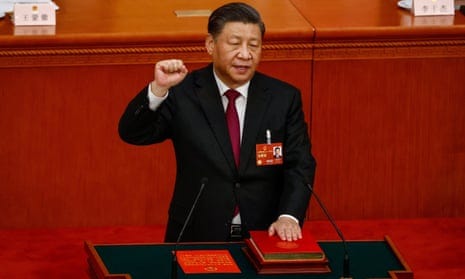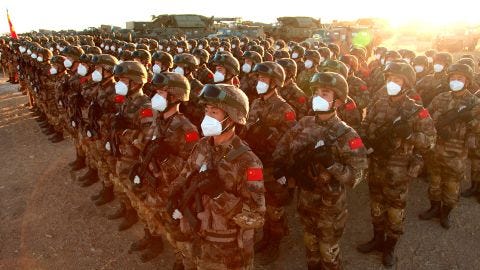Grey Zone SITREP - 10 Mar 2023
China's Political and Cyber Ambitions: Concerns and Challenges in the Pacific Region
Evening team,
Welcome back to the Grey Zone. Lot’s to cover this week including:
President Xi Jinping's third term has begun, consolidating his position as the country's most powerful leader in decades. However, not everyone is in agreement with China's political ambitions, with President David Panuelo of the Federated States of Micronesia expressing concerns about China's political warfare and grey zone activities in his country.
Moving to cybersecurity, IBM reports that the Asia-Pacific region experienced the highest number of cyberattacks in 2022. While ransomware attacks have decreased, China remains a significant cyber adversary.
In military news, both China and the US are increasing their military presence in the Pacific, and the UK's shadow defense secretary acknowledges that the country cannot be a strong military force in both the Indo-Pacific and Euro-Atlantic regions.
Finally, in economic news, China's push to revive its economy is facing challenges due to massive local government debt, raising concerns about the country's modest economic growth target.
If you haven’t already, consider listening to the latest episode of the ALCON Podcast! In the latest episode I talk to Kervin Aucon from Aucoin Analytics and he discusses his experience as a military intel guy supporting things like interrogations and targeting terrorists. It’s such a good conversation and is truly a good listen.
For all paid subscribers, I’m now releasing a Daily DOWNREP (week days only). This is my opportunity to catch you up on all the overnight things you’ve missed out on while you slept. My time zone allows for this noting many of you are US based. Consider subscribing so you are kept up-to-date at the start of each day.
Lastly, here’s some good news. I’m opening up the ALCON Telegram channel to all Grey Zone subscribers - so if you’re interested, flick me a DM with your email address to @alcons2 and I’ll add you to the group. It’s a good channel that’s growing with some good OSINT that is shared regularly.
Cheers,
Cole.
DIPLOMACY
Xi Jinping's third term as president of China has officially begun, cementing his position as the country's most powerful leader in generations. In a highly orchestrated ceremony, Xi made a pledge to "build a prosperous, strong, democratic, civilized, harmonious, and great modern socialist country" as he held up a copy of China's constitution. This comes after Xi was also given another five years as head of the Communist Party and the military, two key leadership positions in Chinese politics.
However, not everyone is in agreement with China's political ambitions. David Panuelo, the president of the Federated States of Micronesia (FSM), has written a letter detailing China's political warfare and grey zone activities in his country. He has also suggested a potential agreement to switch FSM's diplomatic recognition from China to Taiwan. Panuelo has a reputation among world leaders for being insightful, forthright, and candid in his analysis of China's actions and behavior.
Panuelo has previously written two highly influential letters expressing his concerns over China's behavior. In one letter, he expressed apprehension over the China-Solomon Islands security deal, while in another, he warned Pacific Island leaders about the implications of Chinese Foreign Minister Wang Yi's trip through the Pacific Islands. The trip may have influenced other Pacific Island leaders to reject the regional trade and security agreement Wang was advocating for.
China's rise as a global superpower has not been without controversy, and its political ambitions and activities have come under intense scrutiny. Critics argue that China is using its economic and military might to exert influence over smaller nations, often through debt diplomacy and other means of coercion. These actions have raised concerns among other countries, and many are pushing back against China's attempts to expand its influence.
INFORMATION
As we look back on 2022, it's clear that the Asia-Pacific region experienced the most cyberattacks globally, accounting for 31% of all incidents monitored by IBM's threat intelligence platform. The report highlights Japan as the epicenter of a spike in Emotet malware during Russia's invasion of Ukraine, which cybercriminals used as an opportunity to lure victims into opening malicious attachments.
Despite the rise in cyberattacks, IBM notes a drop in ransomware activity in the region, attributing the decline to organizations' increased ability to detect backdoors before ransomware is deployed. Charles Henderson, global head of IBM Security X-Force, emphasized the importance of detecting and responding to cyber threats early in the attack chain to disrupt adversaries before they can deploy ransomware.
However, China remains a major cyber adversary, ranking at or near the top of U.S. national security officials' list. The annual worldwide threat assessment from the intelligence community warns that China is becoming even bolder and better in cyberspace. The report suggests that if China believed it was on the verge of a major conflict with the U.S., it could unleash all of its cyber might to impede U.S. decision-making, induce societal panic, and interfere with the deployment of U.S. forces.
The report also states that China is capable of launching cyberattacks that could disrupt critical infrastructure services within the U.S., including oil and gas pipelines and rail systems. Director of National Intelligence Avril Haines emphasized that the Chinese Communist Party represents the most serious and consequential intelligence rival to the U.S., with intelligence-specific ambitions and capabilities.
MILITARY
As tensions continue to rise between China and the United States, it is clear that both nations are increasing their military presence and capabilities in the Pacific region. However, recent reports suggest that China's military-industrial complex has maintained trade relationships with sanctioned Russian defense companies, despite global pressure to cut ties with Moscow.
According to customs records reviewed by CNN, Beijing-based defense contractor Poly Technologies sent at least a dozen shipments to a state-backed Russian firm sanctioned by the US for its connection to leader Vladimir Putin’s war in Ukraine. This trade relationship is concerning given the ongoing conflict in Ukraine and the potential for Russia to use its military capabilities to exert influence in the Pacific region.
In response to China's aggressive behavior, the US is seeking to increase its military presence in the Pacific. The Pentagon has requested significant funding to support this effort, including investments in missile defense systems, radars, and space sensors. This investment is more than twice what the Department of Defense requested last year and a significant boost from what Congress authorized.
Meanwhile, the UK's shadow defense secretary, John Healey, has acknowledged that Britain cannot be a strong military force in both the Indo-Pacific and the Euro-Atlantic simultaneously. He argued that there needs to be a "realism" about military commitments into the Indo-Pacific and that the country needs to fill a "Europe-shaped hole" in its foreign and defense policy.
ECONOMIC
China's push to revive its economy by increasing infrastructure spending is facing challenges due to massive local government debt, which is over $9 trillion and still growing. According to Fitch, Local Government Financing Vehicles (LGFVs) have $790 billion worth of onshore bonds due this year, the highest since 2021. This situation has led some local governments to request banks to extend maturities and cut interest rates, raising concerns about the LGFVs' ability to meet debt obligations, and its impact on the broader banking sector and markets.
These fiscal challenges are significant as LGFVs play a crucial role in funding infrastructure projects, a significant growth driver for the world's second-largest economy. Moreover, the ability of fiscally stretched local governments to follow through on spending will be a key test for China's modest economic growth target of around 5% this year. The country needs to ensure that the LGFVs' debt does not escalate into a broader financial crisis, which could potentially drag down the entire Chinese economy.
While there have been no public reports of an LGFV default, some have had loans extended. However, Andrew Collier, managing director at Orient Capital Research, argues that LGFVs have become the black hole of the Chinese financial system, used to fill the gap between local government revenue and expenditure. The situation requires careful monitoring, especially as China faces additional headwinds due to a drop in income from land sales and fewer options for raising fresh funds.
Meanwhile, on the Asian stock market front, shares were mixed on Thursday, with China experiencing a softening in its inflation print in February, with its consumer price index growing by 1% YoY, the slowest pace since February 2022. The Shanghai Composite and the Shenzhen Component both shed, while Japan's Nikkei 225 closed higher, up 0.63%, with the Topix also climbing 0.97%. Investors are also closely watching the Bank of Japan's two-day monetary policy meeting, with economists polled by Reuters expecting no changes to its ultra-dovish monetary policy.
Short-Term Assessments - What to Watch
Keep reading with a 7-day free trial
Subscribe to The Grey Zone to keep reading this post and get 7 days of free access to the full post archives.








